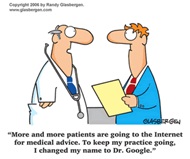 It's something we do to job applicants, first dates, former lovers and the quiet co-worker in the next cubicle. The practice of "Googling" others for professional reasons or out of personal curiosity is so ubiquitous that the name of the popular Internet search engine has turned into a verb, reports Reuters Health.
It's something we do to job applicants, first dates, former lovers and the quiet co-worker in the next cubicle. The practice of "Googling" others for professional reasons or out of personal curiosity is so ubiquitous that the name of the popular Internet search engine has turned into a verb, reports Reuters Health.
In healthcare, patients often head online for diagnoses, drug information and details about their doctors. But do professional standards prevent physicians from doing the same to patients?
The authors of a new paper write that sometimes, the practice is acceptable. Most other times, in their opinion, it isn't. They hope their paper sparks conversation among colleagues and the American Medical Association about the possibility of guidelines for providers in the digital age, one in which most medical students can't remember a world without search engines. "The motivation is to protect patients and prevent harm," said Maria Baker, a Penn State Hershey Cancer Institute genetics counsellor.
"Googling a patient can undermine the trust between a patient and his or her provider, but in some cases it might be ethically justified," Baker says. "Healthcare providers need guidance on when they should do it and how they should deal with what they learn."
With regard to future guidelines, Baker and her co-authors suggest 10 situations that may justify patient-targeted Googling:
Duty to re-contact/warn patient of possible harm
Evidence of doctor shopping — visiting different doctors until a desired outcome is acquired.
Evasive responses to logical clinical questions
Claims in a patient's personal or family history that seem improbable
Discrepancies between a patient's verbal history and clinical documentation
Levels of urgency/aggressiveness are not justified by clinical assessment
Receipt of discrediting information from other reliable health professionals that calls the patient's story into question
Inconsistent statements by the patient, or between a patient and their family members
Suspicions regarding physical and/or substance abuse
Concerns regarding suicide risk
"There is something worth protecting in the physician-patient relationship," said co-author Daniel George, an assistant professor in medical humanities at Penn State University College of Medicine. While the AMA has issued guidelines regarding physician professionalism and social media, George calls patient-targeted web searches a "blind spot" among providers.
Mildred Solomon, president of the Garrison, New York-based bioethics institute The Hastings Centre, said she applauds the authors for raising such questions, but their "acceptable" reasons for "Googling" patients are far too broad. One scenario, "incongruent statements by the patient, or between a patient and family members," occurs too frequently in clinical settings to justify Internet searches, Solomon said. "There's too much wiggle room," she explained, noting that "intention" is what should matter. "Why is the physician motivated to do this? Is it going to bring benefit to the patient, or is it something self-serving or out of personal curiosity?" Solomon asked.
A spokesperson for the AMA declined to comment to Reuters Health, citing the issue as “unresolved” by the organisation.
However, a 2013 policy statement from The Federation of State Medical Boards notes that physician use of digital tools must evolve as do technology and societal trends. It acknowledges the use of “patient-targeted googling” in medical crises, such as attempts to identify unconscious patients in emergency departments. But, according to the policy: “it instead can be linked to curiosity, voyeurism and habit. Although anecdotal reports highlight some benefit (for example, intervening when a patient is blogging about suicide), real potential exists for blurring professional and personal boundaries.”
Authors say they wish only for more dialogue about this digital practice. "I think this is just a starting point," George said. "Every conversation has to start with something. This is the raw clay that we hope the field sculpts into set guidelines."
The SA Medical Association does not have its own guidelines on social media but links through the guidelines of
the British Medical Association.
[link url="http://www.reuters.com/article/2015/02/13/us-doctors-googling-idUSKBN0LH2CC20150213"]Full Reuters Health report[/link]
[link url="http://link.springer.com/article/10.1007%2Fs11606-014-3030-7"]Journal of General Internal Medicine abstract[/link]
[link url="http://bma.org.uk/-/media/Files/PDFs/Practical%20advice%20at%20work/Ethics/socialmediaguidance.pdf"]British Medical Association guidelines on social media[/link]
[link url="http://www.gmc-uk.org/guidance/ethical_guidance/21186.asp"]UK General Medical Council guidelines on social media[/link]
